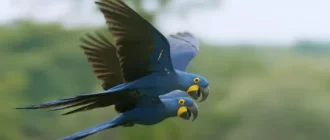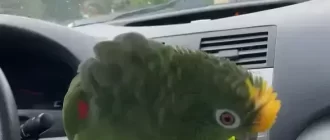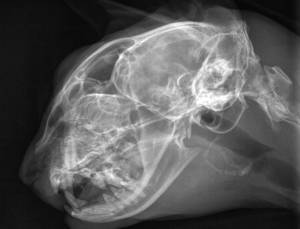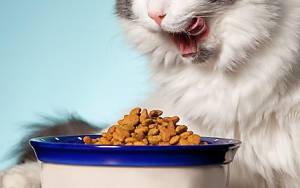Feeding the Maine Coon – a very important issue for the health of these animals. Raccoon cats are known to mankind for a long time, and in terms of popularity in Russia, this breed confidently holds the palm of the first place. In order for a pet to grow up healthy, you need to start feeding him correctly even as a kitten.
General recommendations on nutrition of Maine Coons
Large semi-long-haired Maine Coons have a good-natured and gentle character, are reserved and silent despite their menacing appearance.
Because of their impressive size and certain inherent health problems (weak heart, great strain on the skeleton and teeth), it is important to provide them with a reasonable diet.
Rules for Maine Coon Nutrition
It is worth bearing in mind that adult animals eat a lot. To properly calculate portions, it is necessary to adhere to the following tips:
- Observe the norms of plant polysaccharides, as a kind of building material of the cell.
- Choose the right fiber for optimal gastrointestinal function.
- Avoid eating excessive amounts of carbohydrates, so as not to exceed the critical weight limit for large pets.
- Provide optimal levels of “good” fats in the food, because lipids are the source of energy for the cat’s body. A lack of Omega-3 and Omega-6 fatty acids can lead to hair problems and various diseases.
- Organize feeding with the right amount of animal proteins. Especially important is the amount of arginine, it is in its insufficient composition in animals of this breed can cause cardiovascular system disorders.
- No less important for the healthy work of the heart and taurine, which the body of the carnivore is not able to reproduce itself. In addition, the lack of this element can lead to degeneration of the retina.
- Do not forget the importance of the presence of vitamin complexes and fat- and water-soluble added minerals in the diet.
When organizing the diet of this large pet it is important not to forget about the predatory natural way of life of this animal and provide in the diet complete meat products or dry industrial mixes, as close as possible to the composition of elements to the diet of wild ancestors.
Especially worth seeing to it and feeding Maine Coon regularly at certain hours and keep the pet’s water and solid food bowls clean.
Feeding Maine Coon Pets with Prepared Mixes
Feeding pre-made commercial mixes to pets of this breed is the easiest way to arrange for proper nutrition for your pet.

These are wet canned foods, powders and dry foods that can be stored longer and always have the pet in open access with a bowl of water.
Maine Coons should be fed ready-to-eat foods that are super premium or holistic. In general, there are good foods and premium, but to study the composition in this case, you need to be very careful.
You should not give Maine Coons wet food of cheap brands, such as Viskas, Kitekat, Friskas. Pets usually eat them with pleasure and quickly get used to the flavors, but you should remember that they do not contain quality meat and a lot of mineral salts. We also do not advise feeding cats with Royal Kanin diets for this breed. Indeed, everyone buys them nowadays. But let’s look at the composition. For example, Maine Coon Adult in a sauce for cats over 15 months.
- It is not specified what kind of meat is contained, how much of it, the phrase “meat by-products” – also no specifics, what quality they are, they may not be very good.
- In second place are cereals, again, no specifics, they are badly digested by cats, serve as a cheap filler. It is better that they were not in the food at all, well, or at least not higher than the fifth place.
- There are plant protein extracts, plant by-products in the composition – again, nothing good.
We can conclude that this is economy class, although the manufacturer lists it as premium. Of course, there are no dyes and preservatives, but the same Wiskas does not have them either.
So what wet food can be given? We recommend Animonda, Leonardo, Applaws, Bozita. The latter has a wet food for large breeds, though it contains undesirable cellulose.
If we talk about dry mixes, then today there is a certain rating of these foods, popular with both experienced breeders and private owners:
- Leading the list is Wellness – this is a fairly new product from American manufacturers on the market. Its composition includes natural salmon and tuna, meat and fish meal, a small content of plant components such as peas, no grains. Wellness® Indoor Health for Adult Cat is suitable for young adult animals, but there are also products for pregnant and lactating cats and kittens with a high animal protein content. The disadvantage of this holistic is that it is not yet available in Russia even in all online stores and at a very high price.
- Bosch Sanabelle Grande ranks second in the rating. This German product manufacturer refers to the super premium class, but it is made from products suitable for human nutrition, which meets the criteria of canvas. The composition is based on poultry liver and meat, rice, millet, sorghum. The content of components is optimal for the prevention of urolithiasis, the pellets are large and very liked by pets.
We also recommend Akana, Orijen. Although they have a small selection of flavors, the quality is very high.
We also recommend the following foods:
- Hill’s Nature’s Best™ With Real Chicken Adult Cat. The mixture contains high quality products – poultry meat, vegetable components are represented by oats, rice, potatoes and corn. The protein content is high. Maine Coons like it very much.
- Eukanuba Mature Care Formula for Cats contains many meat components, but it also contains grains. Maine Coons enjoy eating this dry formula, although some pets may have allergic reactions.
- ProNature 30 Adult for Cats – this Canadian food until recently, breeders considered one of the best products in terms of price – quality ratio. In addition, pets ate it with pleasure always. It contains chicken, corn, and peas.
Natural diet for Maine Coons
Most owners of animals of this large breed give preference to natural products in the feeding of their pets. It should be remembered that at least half of the diet should consist of meat ingredients. In the diet the presence of the following components is mandatory:
- Meat and by-products (stomachs, heart, liver) from poultry, primarily chicken.
- Beef in the form of meat and offal, preference should be given to lean varieties.
- Dairy products are low-fat cottage cheese, natural yogurt, kefir, ryazhenka.
- Cheese in the form of hard varieties.
- Cereals – these are porridges made according to special recipes from buckwheat and multigrain mixtures.
- Vegetables fresh and in boiled form – carrots, cabbage, zucchini, pumpkin, cucumber.
- Some kinds of sprouted grains and specially grown herbs.
- Beer yeast and meat and fishmeal.
- Vitamin supplements, special pastes to remove hairballs from the gastrointestinal tract.
As an example of “Maine Coon’s porridge”, in which the bulk of the protein components, we can recommend the following composition:
- meat and by-products from chicken – 80%;
- Dairy products – kefir or cottage cheese – 5%;
- Vegetable and green components (zucchini, pumpkin, cucumber, spinach, celery, carrot) – 5%;
- oat flakes or buckwheat – 10%.
Here is another composition of the “coon” ration, which the owners usually prepare for several weeks, arrange in portions and freeze (in ounce)
- beef kidneys – 17.6;
- beef liver – 17.6;
- heart (beef or veal) – 3.5;
- beef lung – 3.5;
- Necks and heads of chicken broilers – 3.5;
- beef or veal meat – 3.5
- chicken stomachs or hearts – 35.2;
- turkey fillets – 35.2;
- pumpkin and zucchini – 35.2;
- carrots – 17.6;
- kelp – 35.2;
- wheat bran – 17.6.
Byproducts and meat, lightly boiled vegetables are passed through a meat grinder, bran is poured over boiling water and infused. The finished mixture is packaged and subjected to a deep freeze for three to four days.
Before eating, defrost the package and put it in bowls, “coon” porridge can be poured on top of natural unsweetened yogurt or ryazhenka, also add pieces of hard cheese.
Vitamins and minerals
These components play a very important role in the diet of Maine Coons. Preference should be given to complex preparations, having previously discussed their composition and brand with a veterinarian.
Some pets will be fine with mono-supplements containing only certain elements, such as calcium, phosphorus, iron, vitamins B or E.
Usually the veterinarian first evaluates the pet’s urine and blood tests to select the right composition of vitamin and mineral supplements.
These complexes are necessary for natural Maine Coon nutrition, in ready industrial mixes, as a rule, all the vitamins, micro-and macro supplements are present in the required quantity and proportion.
What to feed a Maine Coon Kitten at 2, 3, 4 months and later
The Maine Coon differs from other breeds unusually long period of maturation and growth. Only the formation of the musculoskeletal system is completed by 15 months of life, and the full growth of cats sometimes reaches only four years.
When growing kittens, one should remember that they are gaining weight quickly, by the age of three months the baby weighs at least 4.4 lbs, which is at least twice as much as a kitten of an average domestic cat. Therefore, kitten should get enough calcium, phosphorus, vitamin D for the proper formation of the skeleton, musculoskeletal system and muscles.
In addition, the massive jaw grows very quickly, which is another distinguishing feature of the breed. Pellets of dry food for kittens should have a predominantly cubic shape, so that the load is even. In addition, in this case, the babies have to chew and chew the food carefully, which also contributes to oral hygiene, plaque is well cleaned and tartar is not formed.
The first dry food for kittens is usually given at one month of age and up to six months, its composition remains the same, changing only the number and frequency of feedings.
One-month-old kittens are also given natural milk, with a preference for goat’s milk. Or finished feeding powdered milk formula. Feed initially six times a day, supplementing the diet with cereals, meat and vegetables.
At 3-4 months translate to a meal four times a day, the ration is introduced chopped poultry giblets, vegetable ingredients, dairy products.
From six months to one year is the most active growth period of the Maine Coon Kitten. If the baby does not gain enough weight, then reconsider the diet, changing the ready-made formula for a more nutritious or supplementing the menu with seafood.
The new component is always introduced gradually, carefully watched to ensure that there were no allergic reactions, changes in stool.
The normal growth of the Maine Coon Kitten in a month during this period is 10.5-14 ounces.
Nutrition of the adult Maine Coon Cat
In nature, raccoon cats eat small mammals, so even at home, portions of a healthy, adult cat should be small, and the food should be fractional.
An adult pet should eat 0.2-0.25 ounce of food in a few minutes at a time. It takes about half an hour a day to feed.
Scientists have found that the Maine Coon, as well as Siameth, eat somewhat faster than other breeds of cats, for example, the Persian eats a minute no more than 0.07 oz.
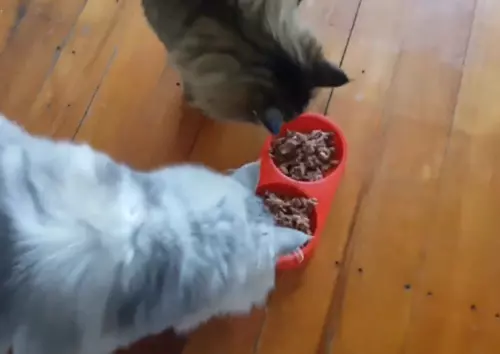
The peculiarities of shape of jaws demand special pellets of dry food, and a cat must always chew them up thoroughly, no matter how it swallows them whole. The food must contain Omega-3 and Omega-6 fatty acids, taurine.
Pets are considered adults from 15 months of age, at the same time they are transferred to food of another age category.
The cubic shape of the pellets will largely help to cope with the cleaning of the oral cavity, but for the prevention of stomatitis and gingivitis, paradentosis it is still better to brush the teeth once a day first with a soft cloth (kittens), and then with a special brush and paste.
Dry food is chosen based on the pet’s preferences, and you can give good-quality wet powders as a treat, respectively reducing the amount of the main product.
Scientists’ studies showed that Maine Coons are characterized by hip dysplasia due to heavy weight (about 23% of animals suffer from it), so their owner must pay more attention to nutrition. Only a quality diet containing polyunsaturated fatty acids will help proper development and maintenance of the normal musculoskeletal system.
Often occur among representatives of this breed and cardiac abnormalities. The most common cases of hypertrophic cardiomyopathy, when there is excessive stretching of the left ventricle organ. This is due to a natural mutation of the protein gene that is responsible for binding cardiac myosin. To rule out the pathology, you should do more kitten appropriate tests and examine him completely. Sometimes the disease does not manifest itself until adulthood, so an ultrasound examination of the heart should be done once a year.
Foods that contain taurine, EPA and DHA in the right proportions can maintain normal heart function of an adult Maine Coon.
Special nutrition should be chosen for pregnant and lactating cats. Experienced breeders transfer expectant mothers to a kitten food high in animal proteins from an early age.
Aging older pets from about the tenth year of life also need a special diet that prevents the development of chronic diseases. Speaking of dry industrial mixes, Eukanuba: “Mature & Senior”, BioMill: “Cat Senior”, Perfect Fit: Senior, Bosch Sanabelle: Senior, Pro Plan: Vital Age 7+ Dry Chicken & Rice have specialized ranges for this age group.
Aetapet.com explains: allowed and prohibited foods
In the case of a natural Maine Coon diet, it is worth listening to the advice of experienced breeders and be sure to include in the diet:
- Chicken heads, tails, necks, wings, and paws. These foods are usually ground and given to pets after deep freezing as part of a “coon gruel,” they contain many substances necessary for a healthy predator’s existence.
- Dairy products, especially cheese, kefir and cottage cheese must be in the diet of the Maine Coon. Should only watch the content of fat.
- It is desirable to give sometimes sea varieties of fish: pink salmon, salmon and cod will do.
There is also quite an extensive list of foods that Maine Coons are fed strictly forbidden:
- Viscous porridge with lots of milk bad for the gastrointestinal tract and often causes diarrhea.
- Forbidden are pastries, cakes, cakes, cookies, jams and jams, other sweets and chocolate.
- Boiled poultry bones should be excluded from the diet, it is the fragments of tubular elements that can traumatize the gastrointestinal tract.
- Pork should be removed from the diet completely, it is a heavy meat product that is dangerous for cats in many ways (except the heart).
- Of vegetables, potatoes, beans, pulses, peas, and tomatoes are unacceptable. They cause gas and diarrhea.
- Do not give river fish, as there is a great risk of parasites. In addition, it has many small and sharp bones.
- Whole cow’s milk is not recommended for adult pets.
- It is also worth excluding sausages, frankfurters, smoked, pickled, canned, salted, sharp and spicy foods.
In a strictly limited amount give the yolk of raw chicken eggs (white is prohibited), olive oil (and other vegetable), poultry liver, seafood.
The most complete types of meat for the Maine Coon are considered turkey, rabbit, beef, and lamb. Chicken is useful, but feeding this bird alone is insufficient in terms of animal protein content.

